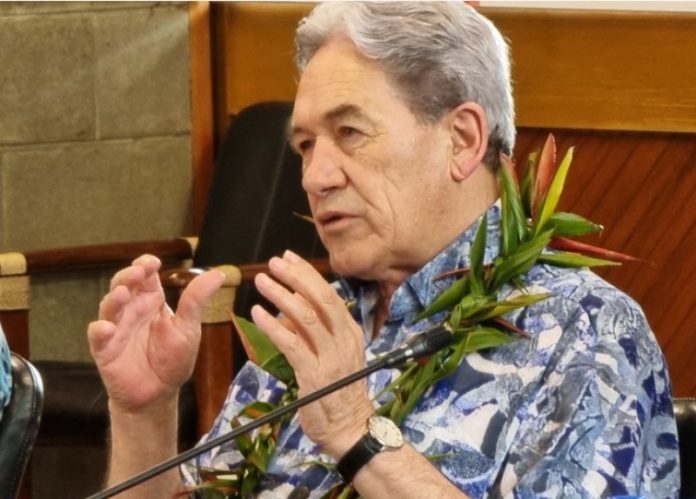New Zealand Foreign Minister Winston Peters is heading on a whistle-stop tour of Polynesia this week — hard on the heels of his visit to Australia that resulted in stronger security and defence ties with our Tasman neighbour.
He’ll have some reassuring to do in his bilateral meetings with Pacific leaders after New Zealand came out supportive of Australia’s AUKUS plans with the U.S and UK to get nuclear-powered submarines, a move many Pacific countries are deeply concerned about.
Peters, along with Dr Shane Reti, who holds the Pacific Peoples and Health portfolios, will meet with the Acting Prime Minister in Tonga and the Prime Ministers of the Cook Islands and Samoa.
Foreign Minister Winston Peters and Health Minister and Minister for Pacific Peoples Dr Shane Reti are reaffirming the importance of New Zealand’s connections to the Pacific by visiting Tonga, Cook Islands and Samoa this week.
“New Zealand enjoys strong and long-standing relationships with our Pacific partners – especially in Polynesia, where we have close political, economic, and people-to-people ties,” says Peters.
“This trip is an opportunity for New Zealand to continue to strengthen and progress our bilateral cooperation with Tonga, Cook Islands, and Samoa while supporting each country’s respective development goals.
“Given New Zealand’s place and influence in the region, our visit will also reinforce our commitment to collectively responding to the many – and varied – strategic issues and challenges facing both the Pacific, and the wider Indo-Pacific,” Peters says.
Minister Reti says he is pleased to undertake a visit to Polynesia, representing both his portfolios.
“New Zealand has deep and longstanding cultural links with the Cook Islands, Samoa and Tonga, and I am looking forward to reinforcing those, as well as discussing the shared issues our communities face in New Zealand and the Pacific, particularly in health.”
The Ministers will meet with the Acting Prime Minister in Tonga, and the Prime Ministers of Cook Islands and Samoa; undertake calls on cultural, community and political leaders; and visit New Zealand-supported activities.
Minister Reti will also meet with select health officials in each country to discuss New Zealand’s role in working together to deliver on long-term health priorities, both nationally and regionally.
Professor Steve Ratuva, director of Canterbury University’s MacMillan Brown Centre for Pacific Studies, says as well as this being a chance for Peters to reconnect with leaders after his last stint as Foreign Minister with the Labour Government, he will also be able to gauge how they are feeling about New Zealand’s more entrenched security relationship with Australia.
He says New Zealand’s image in the Pacific “will change dramatically” from being a leader of the nuclear-free moment to having an independent foreign policy.
“New Zealand has always been seen in the Pacific as being the model in as far as foreign policy is concerned, its independent foreign policy, it’s been able to steer clear of embedding itself in any major ideological positions…so by embedding itself in AUKUS will be seen differently,” he says.
Australian officials are coming to New Zealand to brief the Government on the second pillar of AUKUS which will involve advanced technology such as artificial intelligence, drone or support systems for hypersonic weapons.
Ratuva says given AUKUS has been rejected by Pacific leaders, “maybe Winston Peters wants to find out exactly how they feel about New Zealand being part of AUKUS and any possible strategy of engaging with the Pacific Islands states to make sure that there are no consequences of New Zealand joining AUKUS”.
As well as the region’s anti-nuclear stance, there is also a concern in the Pacific that the procurement of between three to five nuclear-powered submarines will escalate the current geopolitical power contest in the region.
“What Pacific leaders are worried about is that AUKUS and New Zealand joining will escalate the geopolitical contestation and tension in the Pacific.
“What we have seen in the past is a cycle of escalation, so AUKUS is a way of stepping up to China’s escalation in the Pacific… one goes up, and one goes to another level, so that is one of the challenges at the moment,” Ratuva says.
SOURCE: PACNEWS














